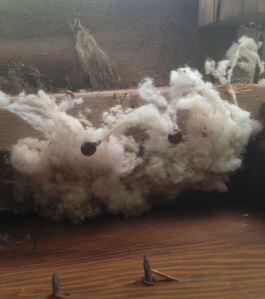Lyme Disease Impacts Southern New Hampshire Pets Too
Posted by Mosquito Squad
December 20, 2023
Last week, we talked about Lyme Disease because May is Lyme Disease Awareness month. That article focused on Lyme Disease in people, but humans aren’t the only ones who can contract Lyme Disease. Pets can too, and this fact is making news in our area. Parade Magazine recently ran an article indicating that pets in the Northeastern USA, which of course includes southern New Hampshire, are more at risk of becoming ill with Lyme. Why? The population of black-legged ticks (or deer tick as it is commonly called) is larger in the Northeast than in many other regions of the county, and these ticks are the primary carriers of Lyme. In our area, your pets could be exposed to Lyme Disease if they are bitten by a tick, and dogs are more prone to tick bites and subsequent infection than cats.
 Lyme Disease symptoms in dogs are not the same as they are in humans. Dogs do not develop the EM or “bulls eye” rash that is so indicative of the disease. Rather, they often go lame suddenly; experience extreme pain; have swollen, feverish joints; are lethargic; and lose their appetite. The disease is serious though, like humans, pets can recover after antibiotic treatment. A dog’s risk of contracting Lyme Disease increases the longer a tick is attached. So what can you do to help prevent exposure?
Lyme Disease symptoms in dogs are not the same as they are in humans. Dogs do not develop the EM or “bulls eye” rash that is so indicative of the disease. Rather, they often go lame suddenly; experience extreme pain; have swollen, feverish joints; are lethargic; and lose their appetite. The disease is serious though, like humans, pets can recover after antibiotic treatment. A dog’s risk of contracting Lyme Disease increases the longer a tick is attached. So what can you do to help prevent exposure?
First, you should check your dog routinely for ticks; daily is best. A black-legged tick in the nymph stage is extremely small (the size of a comma in newsprint), so great care should be taken. If you find any attached ticks, remove them immediately using tweezers and a firm, steady pull. Jerking the tick could cause mouthparts to break off, which can also increase your dog’s risk. There are also many tick prevention products available for pets than can help repel ticks, so talk to your veterinarian about which may be best for your dog or cat.
Evidence that the treated cotton in our tick traps is being used as nesting material.
 Finally, be sure to treat your yard for ticks. Most of your pet’s outdoor time will probably be in your own yard. Making that area as tick-free as possible will reduce your pet’s exposure. Mosquito Squad of Southern New Hampshire uses a two-step method for eliminating ticks. First, we apply a barrier treatment that will kill the ticks currently in your yard. Second, we utilize “tick-tubes”. Tick tubes contain fibrous, tick-killing material rodents like to use in their nests. Ticks proliferate using rodents as hosts, so rodent nests are typically infested with ticks. By utilizing this material, we are able to target ticks in the areas they frequent. Through these two methods, the tick population on your property can be noticeably reduced, and you can get started with our introductory pricing, only a $99 investment.
Finally, be sure to treat your yard for ticks. Most of your pet’s outdoor time will probably be in your own yard. Making that area as tick-free as possible will reduce your pet’s exposure. Mosquito Squad of Southern New Hampshire uses a two-step method for eliminating ticks. First, we apply a barrier treatment that will kill the ticks currently in your yard. Second, we utilize “tick-tubes”. Tick tubes contain fibrous, tick-killing material rodents like to use in their nests. Ticks proliferate using rodents as hosts, so rodent nests are typically infested with ticks. By utilizing this material, we are able to target ticks in the areas they frequent. Through these two methods, the tick population on your property can be noticeably reduced, and you can get started with our introductory pricing, only a $99 investment.
Don’t take chances with your family’s health – the human part of your family or the four-legged part. Contact Mosquito Squad of Southern New Hampshire today and let us be part of Lyme Disease prevention at your home. We want to keep your dogs happy, healthy, and wagging too.
